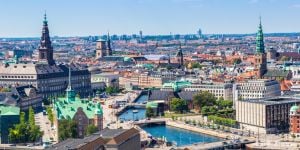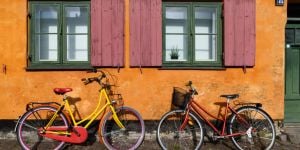Mold prevalence in Denmark?
Last activity 23 May 2018 by luce_lw
1714 Views
13 replies
Subscribe to the topic
Post new topic
Hi everyone,
Can anyone comment as to the prevalence of mold in Denmark? I am specifically looking for info on how common interior mold is (i.e. in residential, commercial, educational buildings, etc.). . .
Are there parts of Denmark that are better or worse mold wise?
Extra Info:
Nice to meet you! I am a 20 yr. old undergrad student who has recently encountered a rather unusual situation. Several months ago I left school due to a genetic disorder involving mold, and other bio-toxins. When I am exposed to mold I become very ill and cannot function (partial seizures, extreme fatigue, etc.--it's a mess). I currently live on the coast of the U.S., and am discovering that everywhere has mold--as such I can't attend local schools, or work indoors, and now I have to move.
I have heard that Europe on the whole has less interior mold due to differences in building materials (I'm not sure if this is true, but it's all I have to go on). So . . . I am looking into either working or attending a folk school in Denmark, however, if mold is present/prevalent this would not be an option.
Any input would be greatly appreciated!
Thanks,
Luce
I shalln't say whether there is much mold in Denmark or not, but mold is absolutely a known issue.
I have been explained that mold spores should be everywhere in the air. They live from dirt and moisture. And the Danish climate is humid.
Mold is unproblematic for most people, but for allergetic ones it can be a big problem as in your case. And as there are many kinds of mold, which of them are you allergetic to?
I am afraid that it will be impossible for you to find a place where you are guaranteed free from mold. A former healthy house which has been updated the wrong way and is suddenly transformed into a risky house. And you cannot know whether this is the case or not in beforehand.
Even if you find it worth trying Denmark, you shall be aware that you shall be able to meet the requirements to come here:
https://www.nyidanmark.dk/en-GB
/Nellie
Hi and welcome to the Forum.
Sorry to hear about your health problem; this link may offer you some advice.
Hope this helps.
Cynic
Expat Team
Hi Nellie,
Thanks so much for your response!
It's an interesting problem--I'm not technically allergic to mold, or specific mold types, but rather I have a set of genes that prevents me from detoxing any toxin released by any mold or related bio-toxins (including VOC's, certain cleaners, formaldehyde, Lyme, etc.). For some reason though, it's been said that outdoor molds do not have the same impact in people with these genes . . . so my primary issue is with interior mold of any kind.
Unfortunately in the U.S. (at least the parts where I've lived in the past), there seems to be a lack of awareness related to impacts interior mold can have on health-- many landlords, owners, and doctors don't want to recognize that it causes legitimate issues.
I've been seeing a lot of research coming out of Europe in relation to the impact of interior mold, so I was hoping somewhere like Denmark, on the whole, might be more aware and therefore people might take better care of their properties and residencies, but I wasn't sure. I was also looking for somewhere I could study, so that too is why I was looking into Denmark specifically.
Also, thank you for the link--I'll definitely take a look!
Do you know if there are parts of Denmark that are less or more humid than others? (I couldn't find that information online) . . . or broadly speaking, do you have a personal opinion on other locations in Europe that might be less humid?
Thanks again!
-Luce
Hi Cynic,
Thanks so much for the link! The chart will definitely be good to have for reference! I've lived in a couple of the 'better' mold states in the past, and am currently considering a move to Colorado, but haven't had much luck yet. Do you happen to know of any similar links pertaining to Europe?
-Luce
SimCityAT wrote:You can get mould anywhere and in all countries.
I understand why you are examining all opportunities, but I think avoiding mould shouldn't be the reason to leave the US as you may find the problem even worse in Europe.
I have found a couple of links, but I admit that I have only skimmed the contents, but they may make you a bit wiser on the subject.
https://www.nature.com/articles/jes201221http://www.euro.who.int/__data/assets/p … E92645.pdf
/Nellie
This is interesting as in my previous work I was involved in environmental studies related to pollution and poor air quality in the UK; nothing to do with mould directly, more to do with carbon fuel emissions. From information, I gained at my previous work and seeing some of the stuff related to mould, I'm seeing similarities. However, you have to temper that with the fact that any fool can post something on the Internet and all of a sudden things become "facts" that have no basis in reality. So the rest of this is definitely "user beware"
It seems that mould can be a problem anywhere; mould has links to things like poor respiration, asthma, COPD etc. However, these medical issues are not solely created by mould, so it is difficult to say, yeah, go and live in Inverness in Scotland because the climate is perfect, because it seems that there is much more to it than just climate.
My opinion. Mould in general, is pretty simple, it develops in places which are damp and have poor air quality; this is a situation that can happen anywhere, even countries with generally good clean climatic regions and sound environmental policies can, due to human/social activity and industrialisation, have areas with micro-climates that are conducive to mould development. Much of Europe is industrialised and some older building and structures where people live and congregate are over 200 years old and were never designed with the environment as a priority; you could be forgiven for thinking the opposite.
My simplistic view is that if you suffer from respiratory problems, you need a non-industrialised area, at high-altitude, in a perhaps modern building designed to have good airflow that prevents mould development. That said, heat and humidity seem to be a factor; for example, when I lived in Belize, the mould was a massive issue; I had a leather jacket that was destroyed by it in the 6-months it was hung in a closet.
So where in Europe do you find this; there is probably a climatic band in southern Europe which meets what I've said, but I can't think of any that would be better than the Rocky Mountains in the US/Canada. However, wherever you live, you cannot live in isolation; there is no one country that is perfect and at some stage, you're going to have to go into poor climatic areas for things like shopping, visiting the doctor, going to an airport - these are all things that tend to be in an industrialised area.
You also need to consider what I call the political aspects of this; if you have an existing health condition, you are unlikely to get permission to live in many European countries without some very expensive Health Insurance.
Not sure how much I've helped, but I wish you the best of luck in your journey.
Cynic
Expat Team
Nellie Berg wrote:SimCityAT wrote:You can get mould anywhere and in all countries.
I understand why you are examining all opportunities, but I think avoiding mould shouldn't be the reason to leave the US as you may find the problem even worse in Europe.
I have found a couple of links, but I admit that I have only skimmed the contents, but they may make you a bit wiser on the subject.
https://www.nature.com/articles/jes201221http://www.euro.who.int/__data/assets/p … E92645.pdf
/Nellie
Hi Nellie,
Thanks for those links! I read through the WHO Guidelines for Indoor Air Quality booklet a couple of months ago—It has some really good information. Both links seem to indicate substantially less risk for interior mold in Europe than in the U.S. (very very broadly speaking). Unfortunately, interior mold is the only reason I have left school and am moving from the region I currently live in, however, it is not the only reason I am looking into Denmark. Among other motives I’ve always been very interested in Scandinavian culture and have wanted to attend a Danish folkehøjskole for years—if I could find one in a building healthy enough to attend that’d be a dream come true! :-)
I definitely don’t expect to completely avoid interior mold, my only goal is to reduce my exposure as much as possible. So like you said, I’m just examining all opportunities.
Thanks for your comments,
Luce
Hi Cynic,
Thanks so much for taking the time to write such a detailed and thoughtful reply! I really appreciate it!
In my particular case the mold and bio-toxin illness (called CIRS—Chronic Inflammatory Response Syndrome) manifests more as an autoimmune disorder (so along the lines of Hashimoto's disease, or Lupus—though mine has not developed that far). While respiration issues are a symptom, it’s not necessarily a primary consideration in location choice--though I'd certainly prefer the cleanest air I can get!
From what I’ve learned through both personal experience and research is that even the specific climate of a region doesn’t necessarily dictate the prevalence of interior mold in a given area (though it can certainly be a major component, especially like you referred to in Belize). One of the largest factors I’m taking into consideration currently is the type and quality of building supplies in various places. Somewhere like the state of Arizona, would seemingly be one of the best places for me to move with the general dryness, lack of humidity, and heat—however the building supplies (though this is a broad statement) are relatively poor, and the buildings extremely air conditioned leading to unusually high amounts of interior mold.
I have also been looking into a move to the Rocky Mountains, particularly where they cross into Colorado, but more in the hopes that people have a greater awareness and consciousness when it comes to mold, building supplies, and construction than they do where I currently live in the Appalachian mountains.
A major reason I’ve been researching Europe is actually, in part, for the sake of the old buildings, as contrary to my situation as that may sound. Modern building materials (particularly in the U.S.) seem to have the absolute worst interactions with mold, and between their supposed ‘energy efficiency’ (making the buildings really tight, with lack of outside air flow, or proper ventilation) plus, the high usage of air conditioning-- it’s been extremely difficult to find a home I can live in. A building that has no AC, and uses real natural materials (like real plaster, wood, stone, etc.) with mold would be worlds better than a modern poorly constructed building with mold (at least from my region). Though again, it's been really tough to find an old quality building here. A summer or so ago I stayed in a youth hostel in Switzerland constructed in the 16th century (though I could be wrong with that timeframe) with no AC, lots of open windows, and definitely quality materials-- and felt the best I've felt in years. Though, that was just one situation and doesn't necessarily indicate anything concrete. I don't know much information on current building practices in Europe though, particularly Denmark, and especially how they differ from current practices in the U.S. . . I have no idea if they'd be better, worse, or about the same . . .
Everything though is certainly circumstantial! I'm sure there's a healthier building or location option somewhere for me in the U.S., but if quality building supplies + no air conditioning systems are more common somewhere in Europe, I'd definitely consider attending a school, or a potential move . With that being said, I don’t expect to totally avoid interior mold anywhere I am, I just want to reduce the amount of exposure as much as possible. In any case I'm just gathering all the information I can! :-)
The insurance aspect is an excellent point!
Sorry for such a long reply! Also, thanks again so much for your help and comments!
All the very best,
Luce
luce_lw wrote:Hi Cynic,
Thanks so much for taking the time to write such a detailed and thoughtful reply! I really appreciate it!
In my particular case the mold and bio-toxin illness (called CIRS—Chronic Inflammatory Response Syndrome) manifests more as an autoimmune disorder (so along the lines of Hashimoto's disease, or Lupus—though mine has not developed that far). While respiration issues are a symptom, it’s not necessarily a primary consideration in location choice--though I'd certainly prefer the cleanest air I can get!
......................................
Sorry for such a long reply! Also, thanks again so much for your help and comments!
All the very best,
Luce
Forgive my snipping your post.
Thanks for the response; as you seem to have your heart set on moving to Denmark, then I'll point you to our Handy Tools section at the top of the page, this contains our Expat Guides which have all sorts of information that will help you plan your journey.
If you have any further specific questions, then please come back to us.
I wish you the best of health and the best luck on your journey.
Hope this helps.
Cynic
Expat Team
An expert from the Institute of Technology Teknologisk Institut) once told me: The buildings from the 50's are the most healthy. Before that time, the materials weren't of the best quality (due to wars, depression ....), and in the 50's and 60's new materials were introduced, and everything went so fast that the quality was low. And after then (due to the oil crisis) all houses were built too dense to lower the energy consumption.
But still, a house from the 50's may be updated many times.
Folkehøjskoler are still very popular, and it's possible to follow a holiday course a week, two weeks .. so you can see how it feels.
Best luck,
Nellie
Cynic wrote:If you have any further specific questions, then please come back to us.
I wish you the best of health and the best luck on your journey.
Hope this helps.
Cynic
Expat Team
Cynic,
Great--thanks so much again for all your links and responses!!
All the best,
Luce
Nellie Berg wrote:An expert from the Institute of Technology Teknologisk Institut) once told me: The buildings from the 50's are the most healthy. Before that time, the materials weren't of the best quality (due to wars, depression ....), and in the 50's and 60's new materials were introduced, and everything went so fast that the quality was low. And after then (due to the oil crisis) all houses were built too dense to lower the energy consumption.
But still, a house from the 50's may be updated many times.
Folkehøjskoler are still very popular, and it's possible to follow a holiday course a week, two weeks .. so you can see how it feels.
Best luck,
Nellie
Hi Nellie,
Thanks for your comment—that’s a really interesting explanation.
I’ll definitely look into the holiday courses--
Thanks again,
Luce
Articles to help you in your expat project in Denmark
 Choosing your neighbourhood in Copenhagen
Choosing your neighbourhood in CopenhagenHere are the neighbourhoods in Copenhagen ranked from most to least expensive. The different areas have unique ...
 Phones and internet in Denmark
Phones and internet in DenmarkOnce you arrive in Denmark, you need to get connected. Here are some tips for choosing a mobile phone operator, ...
 Getting around Denmark
Getting around DenmarkExpats can rest assured, knowing that Denmark offers an extensive transportation network with reliable and ...
 Buying property in Copenhagen
Buying property in CopenhagenEven if you have lived as an expat in different places, Copenhagen's property market is a whole new ball game. ...
 Sports in Copenhagen
Sports in CopenhagenDespite a generally cool climate, Copenhagen offers its inhabitants plenty of opportunities to enjoy sports both ...
 The Working Holiday Visa for Denmark
The Working Holiday Visa for DenmarkThanks to the Working Holiday Visa program in Denmark, you can discover all that the country has to offer while ...
 Getting around Copenhagen
Getting around CopenhagenIn Denmark's capital, there are plenty of ways to get around the city. There are well-developed bus, train, and ...
 Drivers license in Denmark
Drivers license in DenmarkThere are 2 topics about getting a drivers license:
Find more topics on the Denmark forum



